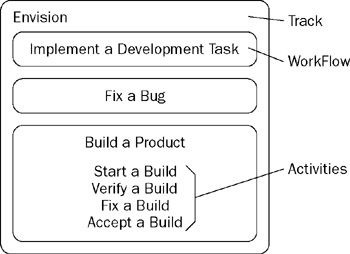Workstreams
MSF for Agile Software Development is composed of 14 different workstreams. Fundamentally, work- streams are activities composed of other activities and are primarily role based. Workstreams are described using the Entry, Task, Verification, and Exit (ETVX) process initially developed by IBM.
MSF for Agile Software Development has more than 70 different activities (not including workstreams). Each workstream has about five activities and each role has approximately two and one-third work- streams. Most workstreams don't span multiple roles.
For example, a tester has three workstreams in MSF for Agile Development: Test a Scenario, Test a Quality of Service Requirement, and Close a Bug. To test a scenario, a tester must go through several activities including defining a test approach, writing validation tests, selecting and running test cases, opening bugs and conducting exploratory testing. These activities are iterative and don't neccesarily have to be executed sequentially. The tester can use the Manual Testing capabilities to write test cases, the Unit Test Framework provides the tester with the capability to write validation tests and much more.
The architect on the other hand has only one workstream: Create a Solution Architecture. This workstream is composed of six different activities including partitioning a system, designing interfaces, developing threat models, developing performance models, creating architectural prototypes, and creating an infrastructure architecture. The design component of the architect's activities is nicely supported by Team Edition for Software Architects. Other models can be designed using Visio and tracked using work items.
Figure 21-10 shows how workstreams, tracks, and activities interrelate.

Figure 21-10
EAN: 2147483647
Pages: 220